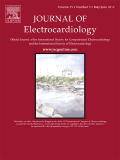
Journal of Electrocardiology
metrics 2024
Fostering Knowledge in Electrophysiology and Beyond
Introduction
Journal of Electrocardiology, published by CHURCHILL LIVINGSTONE INC MEDICAL PUBLISHERS, stands as a significant resource in the field of cardiology and cardiovascular medicine since its inception in 1968. With its ISSN 0022-0736 and E-ISSN 1532-8430, the journal provides a platform for advancing knowledge concerning electrocardiology, which encompasses a broad spectrum of topics from electrophysiology to clinical practices. The journal is currently categorized as Q3 within the 2023 Scopus rankings, indicating its role in disseminating pivotal research amid a competitive landscape. Although not an open-access publication, it remains widely accessible through various academic libraries, fostering an engaged readership among researchers, practitioners, and students interested in cutting-edge developments in cardiac health. The Journal of Electrocardiology seeks to bridge clinical practice and innovative research to improve outcomes in cardiovascular care, making it an essential resource for anyone dedicated to enhancing heart health.
Metrics 2024
 0.43
0.43 1.30
1.30 1.30
1.30 68
68Metrics History
Rank 2024
Scopus
IF (Web Of Science)
JCI (Web Of Science)
Quartile History
Similar Journals
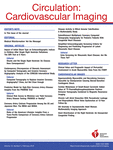
Circulation-Cardiovascular Imaging
Exploring the intersection of cardiology and innovative imaging.Circulation-Cardiovascular Imaging is a prestigious journal published by LIPPINCOTT WILLIAMS & WILKINS, dedicated to advancing the field of cardiovascular imaging through high-quality research and review articles. With an impact factor placing it in the Q1 category across key areas including Cardiology and Cardiovascular Medicine, Medicine (miscellaneous), and Radiology, Nuclear Medicine and Imaging, this journal fosters scholarly communication among leading experts and emerging researchers. Established in 2008, it has rapidly become an essential resource for academics and professionals, given its commitment to disseminating groundbreaking findings and methodologies that influence clinical practices and patient outcomes. Circulation-Cardiovascular Imaging is designed to engage a wide audience, from seasoned practitioners to students keen on exploring the nexus of cardiology and innovative imaging techniques. Its significant visibility in the medical literature underscores its role as a cornerstone in the evolution of cardiovascular diagnostics and patient care.
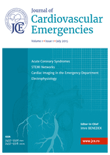
Journal of Cardiovascular Emergencies
Fostering global collaboration in the fight against cardiovascular emergencies.Journal of Cardiovascular Emergencies is a premier open-access journal dedicated to advancing the field of emergency cardiovascular care. Published by SCIENDO, the journal has been an essential resource for healthcare professionals since its inception in 2015, prioritizing the dissemination of cutting-edge research, case studies, and reviews that address acute cardiovascular conditions. With the ISSN 2457-5518 and E-ISSN 2457-550X, it stands as a valuable platform for researchers and practitioners alike, offering insights that can lead to improved patient outcomes in emergency settings. The journal, based in Warsaw, Poland, aims to foster collaboration and knowledge exchange within the growing community of cardiology and emergency medicine professionals. By making its content freely accessible, the Journal of Cardiovascular Emergencies underscores the importance of knowledge sharing in tackling the challenges presented by cardiovascular emergencies on a global scale.

Cardiovascular Digital Health Journal
Elevating Cardiovascular Care Through Digital InsightsCardiovascular Digital Health Journal is a premier publication dedicated to advancing the field of digital health technologies in cardiovascular care. Published by Elsevier, this journal is a vital resource for researchers, professionals, and students engaged in the exciting intersection of cardiovascular medicine and innovative digital solutions. With an ISSN of 2666-6936, the journal spans from 2020 to 2024 and is categorized in Q2 across prominent fields including Biomedical Engineering, Cardiology and Cardiovascular Medicine, and Critical Care and Intensive Care Medicine, reflecting its influential position in the academic community. Although currently not an open-access journal, it offers access through institutional subscriptions, enabling a broad reach for cutting-edge research. The Cardiovascular Digital Health Journal not only strives to disseminate high-quality studies but also aims to foster collaborative insights that propel the integration of digital health in cardiovascular practice, addressing the critical needs of health systems worldwide.

World Journal of Cardiology
Advancing cardiovascular knowledge for a healthier world.World Journal of Cardiology, published by BAISHIDENG PUBLISHING GROUP INC, stands out as a pivotal resource in the field of cardiology and cardiovascular medicine. With an ISSN of 1949-8462, this journal serves a global audience, promoting knowledge dissemination and collaboration among researchers, healthcare professionals, and students dedicated to advancing cardiovascular health. The journal demonstrates its credibility and impact in the field by achieving a respectable Q2 ranking in the 2023 category of Cardiology and Cardiovascular Medicine. Notably, it is listed in the Scopus database, ranking #189 out of 387 journals, placing it in the 51st percentile, which underscores its relevance and contribution to contemporary cardiovascular research. Although it operates under a subscription model, the journal provides diverse access options, ensuring that critical findings reach a wide audience. Through its comprehensive scope and commitment to publishing high-quality articles, the World Journal of Cardiology plays a vital role in shaping the future of cardiovascular science, making it an invaluable asset for those involved in this essential discipline.
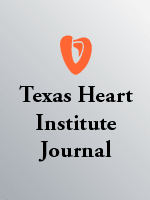
TEXAS HEART INSTITUTE JOURNAL
Exploring Innovations in Heart Care and Research.TEXAS HEART INSTITUTE JOURNAL, published by the renowned Texas Heart Institute, stands as a pivotal resource in the field of cardiology and cardiovascular medicine. With a history spanning over four decades since its establishment in 1982, this journal addresses a wide range of topics within its scope, including clinical studies, innovative treatments, and groundbreaking research in heart health. Despite its Q3 ranking in both Cardiology and Cardiovascular Medicine, the journal is committed to fostering advancement in medical knowledge and practice, providing an essential platform for healthcare professionals and researchers alike. While currently lacking open access, the journal is recognized for its contributions to the field, aiming to illuminate critical healthcare discussions and promote the exchange of ideas. For those interested in staying at the forefront of cardiovascular research, TEXAS HEART INSTITUTE JOURNAL offers invaluable insights and the latest developments shaping the future of heart care.

JACC-Basic to Translational Science
Exploring the Frontiers of Cardiovascular InnovationJACC-Basic to Translational Science, published by Elsevier Science Inc, is a distinguished open access journal that has been advancing the field of cardiology and cardiovascular medicine since its inception in 2016. With an ISSN of 2452-302X and an impressive Q1 ranking in Cardiology and Cardiovascular Medicine as per the 2023 category quartiles, the journal is recognized for its commitment to publishing high-quality research that bridges the gap between basic science and clinical application. Operating from its base in the United States, JACC-Basic to Translational Science is at the forefront of enriching the academic community and healthcare professionals with cutting-edge studies and insights. The journal's robust reach is highlighted by its rank of #14 out of 387 in Scopus for its pertinent subject area, placing it in the 96th percentile. It aims to provide an open access platform that fosters collaboration and the exchange of ideas to ensure the continuous advancement of cardiovascular research. Readers can easily access the latest findings and contribute to the ever-evolving landscape of cardiology through this esteemed publication.

International Journal of Angiology
Advancing cardiovascular knowledge for a healthier tomorrow.Welcome to the International Journal of Angiology, a distinguished publication dedicated to advancing the field of cardiology and cardiovascular medicine. Published by THIEME MEDICAL PUBL INC, this journal plays a crucial role in disseminating innovative research and clinical insights from 1992 through 2024, serving as a vital resource for researchers, healthcare professionals, and students alike. With an ISSN of 1061-1711 and an E-ISSN of 1615-5939, the journal currently holds a respectable Q4 ranking in the cardiology field, reflecting its commitment to quality and relevance. Although it operates under a traditional access model, the journal ensures that critical research findings are shared with a broad audience, fostering collaboration and knowledge exchange. By exploring current trends, diagnostic techniques, and treatment modalities in angiology, the International Journal of Angiology remains an essential platform for those dedicated to improving cardiovascular health around the globe.
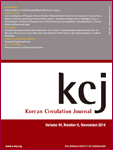
Korean Circulation Journal
Connecting Researchers and Practitioners for Heart Health Advancements.Korean Circulation Journal, published by the Korean Society of Cardiology, has established itself as a prominent platform for disseminating research in the fields of Cardiology and Cardiovascular Medicine. With an ISSN of 1738-5520 and an E-ISSN of 1738-5555, this journal has been at the forefront of cardiovascular science since its inception in 2006 and is projected to continue until 2024. The journal's commitment to quality is reflected in its 2023 category quartiles, ranking in the second quartile (Q2) for both Cardiology and Internal Medicine, as well as its commendable Scopus rankings within the respective fields. Located in South Korea, the journal aims to bridge the gap between cutting-edge research and practical applications, serving as an invaluable resource for researchers, healthcare professionals, and students keen on advancing their understanding of cardiovascular health. Although currently not an open-access journal, it provides a wealth of knowledge that encourages evidence-based practice in clinical settings.

ANNALS OF NONINVASIVE ELECTROCARDIOLOGY
Exploring the future of cardiovascular health through innovation.ANNALS OF NONINVASIVE ELECTROCARDIOLOGY is a peer-reviewed journal published by WILEY that has been pivotal in advancing the field of cardiology since its inception in 1996. With an ISSN of 1082-720X and an E-ISSN of 1542-474X, this journal offers open access to its research since 2020, reflecting a commitment to disseminating knowledge widely within the academic community. The journal operates from the United Kingdom, and its current category quartiles—Q3 in Cardiology and Cardiovascular Medicine, Medicine (miscellaneous), and Physiology (medical)—underscore its relevance to these dynamic fields. Although currently ranked in the 53rd percentile for Cardiology and Cardiovascular Medicine and 39th percentile in the Physiology category according to Scopus rankings, the ANNALS OF NONINVASIVE ELECTROCARDIOLOGY aspires to foster impactful research relating to noninvasive electrocardiology techniques, offering insights into cardiovascular health without the need for invasive procedures. This is particularly important as noninvasive methods continue to evolve and influence clinical practices. For researchers, professionals, and students alike, this journal serves as a vital resource for current studies, innovative methodologies, and breakthroughs in the understanding of cardiovascular functions.
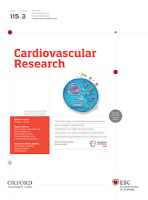
CARDIOVASCULAR RESEARCH
Exploring the complexities of cardiovascular health.CARDIOVASCULAR RESEARCH, published by Oxford University Press, is a premier academic journal dedicated to the evolving field of cardiology and cardiovascular medicine. With a remarkable impact factor reflecting its significant contribution to the scientific community, this journal maintains a Q1 ranking in both Cardiology and Physiology categories, demonstrating its commitment to publishing high-quality research that influences clinical practices and healthcare outcomes. Established in 1967, the journal has consistently provided a platform for innovative studies and reviews, aiming to advance our understanding of cardiovascular physiology and pathology. Researchers, professionals, and students will find published articles crucial for their work, as the journal covers a broad spectrum of topics including molecular biology, genetics, and clinical studies. While currently not offering open access options, CARDIOVASCULAR RESEARCH remains accessible through institutional and individual subscriptions, ensuring that the latest findings are available to those in the cardiovascular science community.